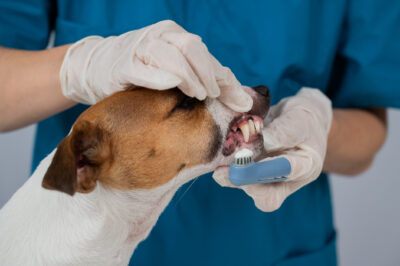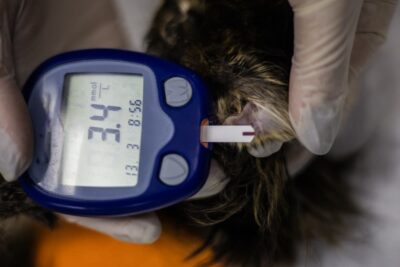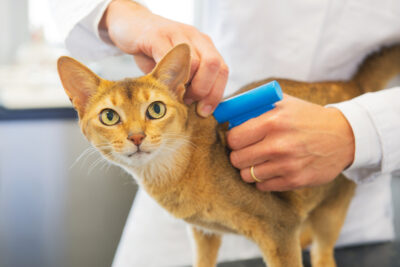Hemp Oil for Pets: Everything You Need to Know

Overview
- CBD is the abbreviation used for cannabidiol. Hemp-derived CBD contains less than 0.3% THC.
- Hemp-derived CBD products formulated for pets are legal and safe for dogs and cats.
- CBD contains no intoxicating properties and will not get your pet high.
- CBD pet products are available in the forms of oils, treats, chews, pills, and topicals.
- State veterinary laws may prevent vets from recommending or prescribing CBD products.
- If you are interested in CBD for your pet, start a conversation with your veterinarian and conduct independent research.
These days, it may feel like you’re hearing about CBD oils and other new CBD products having a positive impact on health and wellness—for us and for our dogs and cats.
But what exactly are CBD products for pets? Do they really work? And more importantly—are they safe?
It can be hard to sift through all the marketing speak and get down to the facts about CBD for dogs and cats. I’ve put together this reference article to help you learn all about the terminology, the potential benefits, and the things you should consider when speaking to your veterinarian and shopping for products.
What is CBD?

CBD is the abbreviation used for cannabidiol, one of the chemical compounds derived from either hemp or marijuana plants.
CBD acts on the endocannabinoid systems (ECS) of both humans and pets, including dogs and cats. The endocannabinoid system is a unique communications system in the brain and body that affects many important functions, including how a pet feels, moves, and reacts.
When extracted and used in oils, chews and other products, CBD can potentially assist with a variety of different conditions including calming, relaxation, and potentially even osteoarthritis pain relief for our pets.
Differences Between Hemp and Marijuana
Both hemp and marijuana are varieties of the Cannabis sativa plant. Both contain CBD, but the main difference between the two comes down to the THC levels found in both plants.
THC is abbreviated for delta-9-tetrahydrocannabinol, which is the chemical compound responsible for the intoxicating effects associated with cannabis.
Hemp has less than 0.3 percent THC by dry weight at the time of harvest. But marijuana has greater than 0.3 percent THC.
Can CBD Get My Pet High?
CBD is the non-intoxicating component of both hemp and marijuana plants. Unlike THC, CBD cannot get you or your pets high, if dosed appropriately.
However, CBD can influence brain activity in pets, which leads to some of the potential benefits, such as a reduction in stress and anxiety for dogs and cats.
Pets should never be given an intoxicating level of THC. It’s important to discuss dosage instructions with your veterinarian and to never experiment with products not created specifically for pets.
Is CBD Safe for Dogs and Cats?
Studies have shown that CBD products have a wide margin of safety in both dogs and cats. Multiple veterinary studies published in the past two years have shown that, even when given high levels of CBD, pets experienced no major adverse effects (1) (2) (3).
Remember, CBD contains no intoxicating properties and will not get your pet high.
As more research is conducted, we will all gain more information regarding the effect of long-term use of CBD products in pets.
Potential Benefits of CBD for Pets

Hemp-derived CBD products for pets are still new in the veterinary space, so the scientific verdict is still out on what CBD can and cannot do from a medical perspective.
Hemp-derived products work conjointly with a pet’s natural endocannabinoid system, which helps to regulate many of the body’s different functions in our dogs and cats.
Based off of both human and veterinary literature, CBD products may also help pets in the following ways:
- Anti-inflammatory (i.e. hypersensitivity, dermatitis)
- Reduction in pain
- Reduction in seizures and convulsions
- Immune system support (i.e. autoimmune disease, cancer)
- Nervous system support
- Cardiovascular system support
- Reduction in anxiety
- Gastrointestinal support
There is also anecdotal evidence to support the use of hemp-derived CBD products for pets. A 2018 survey revealed that pet owners endorsed hemp CBD treats and products because of perceived improvement in numerous ailments including pain, inflammation, anxiety, digestive system issues, and aid with sleep. A few published peer reviewed studies showed that using hemp-derived CBD oil improved the lives of dogs with osteoarthritis (4) (5).
How Do Cats and Dogs React to CBD?
Significant research still needs to be performed to thoroughly compare the differences between the endocannabinoid system of pets and how this system responds to phytocannabinoids (synthetic and plant-based cannabinoids) like CBD.
There are two major types of cannabinoid receptors in a pet’s body—CB1 and CB2. These receptors help to balance and regulate a pet’s immune and central nervous system, which can ultimately influence inflammation, pain, allergies, and mood.
There are three main components of the endocannabinoid system: the receptors, the endocannabinoids and the enzymes. The endocannabinoids (chemicals naturally produced in a pet’s body) are generated on demand and bind to the receptors, especially in times of stress, disease or injury.
Phytocannabinoids, like CBD, work similarly to the endocannabinoids by also binding to the cannabinoid receptors.
Dogs have the highest density of CB1 receptors in the brain compared to any other species, including humans. A recent publication indicated that cats appear to have lower absorption and possibly faster elimination of CBD compared to dogs. Therefore, cats may need to be dosed more often to maintain appropriate blood levels of CBD.
Every pet is different, and not all dogs and cats will see the same results from using CBD products. Talk to your veterinarian if you have any concerns or questions about how your pet is reacting to a specific product.
CBD Pet Products: Understanding the Landscape

Pet parents will find a variety of CBD products on the market, and each has a different use and is designed to serve a specific purpose. While products vary by manufacturer and brand, below are a few common CBD product types and labeling information that interested pet owners should become familiar with.
CBD Oil for Pets
CBD oil for pets—also known as an oil tincture—consists of an extract (either full or broad spectrum) that has been suspended in a carrier oil. A common oil is usually MCT/coconut oil, fractionated coconut oil, but others can be used (6).
The biggest advantage to using CBD oil is that it is dispersed to pets using a measured dropper. This allows you to dose your pet much more accurately and adjust the dose (up or down) as often as needed. Also, since oil is administered either under your pet’s tongue, cheeks or in your pet’s mouth, it has the potential to be absorbed more quickly through mucous membranes than if your pet swallows a pill or capsule.
The two main disadvantages of using an CBD oil tincture is that some pets don’t love the taste of plant material extract and oils are more difficult to travel with due to possible leakage.
When giving CBD oil to your pet, we recommend dropping it directly in their mouth (the preferred method) or you can put it in a treat or on top of their food. When dosing directly in a pet’s mouth, consider placing it on the side, up against your pet’s cheek, rather than directly on the tongue.
CBD Treats and Chews
CBD treats and chews are a great way to get CBD extract into your pet, especially if they enjoy taking treats. These products are made similarly to regular CBD oils, but then the final oil product is infused into a treat or chew.
The benefit of using a CBD chew for your dogs or cats is that it is easier to administer, because they are usually tasty and pets enjoy the taste. The downside is that the dose can’t be incrementally adjusted (up or down), which doesn’t provide as much control as the oil tincture.
CBD Topical Products for Pets
Administering cannabidiol directly to the skin is another popular way to utilize CBD products. These products are designed to alleviate local conditions including aches and skin issues. This method of application is effective because there are cannabinoid receptors found in a pet’s skin.
When applying a topical CBD product to your pet, we recommend placing it on a non-haired area (or a shaved area) and making sure your pet does not lick the site for at least 30-45 minutes.
CBD Capsules and Pills for Pets
Capsules are made in a similar way to regular CBD oils for pets, but the final oil product is suspended in a gel capsule. These are popular options because they work for pets that are averse to the taste of CBD oil or who happen to be picky eaters. Also, capsules are ideal for traveling. They are less messy and easy to carry around.
There are two downsides of capsule CBD products for pets. Just like chews, the dosing cannot be easily adjusted (up or down) when giving pets capsules. Also, a pet’s body does not absorb these as easily as an oil product.
When administering a CBD capsule to your pet, consider placing it directly into their mouth or in a fun treat (like pet-safe nut butter, cream cheese, or a pill pocket).
Full-Spectrum Vs. Broad-Spectrum CBD Products
When researching a product for your pet, the CBD effects are not the only thing you should consider. When you see the terms “full spectrum” and “broad spectrum” on labels, it provides some insight into what other compounds are in the products.
Broad-spectrum CBD products for pets are extracted from the hemp plant. They include all of the other compounds from the plant—except THC. In broad-spectrum products, the THC is entirely removed after the initial extraction.
Full-spectrum CBD products for pets are extracts that contain all of the compounds naturally found in the original hemp plant, including cannabinoids (THC and CBD), terpenes and flavonoids. Full-spectrum, hemp-derived products contain less than 0.3 percent THC by dry weight. All of these active compounds work together to provide amplified health benefits, a phenomenon called the entourage effect.
You may also come across the phrase CBD isolate when researching products. CBD isolate is the purest form of CBD and is made by extracting it from the plant and removing all other compounds except for CBD. Isolate is usually 99 percent pure. However, there is evidence to support that it is more beneficial to use a full-spectrum or broad-spectrum product over isolate therapy due to the added benefits of the entourage effect (7) (8).
What Are Terpenes?
In addition to full-spectrum and broad-spectrum labeling found on CBD pet products, you may notice references to terpenes. Terpenes are essential oils found within marijuana and hemp plants that give the plant its distinct odor and taste. Each plant species has a different terpene profile. This specific profile is based on several factors in the environment that the plant is grown in such as the humidity, temperature, light, quality of the soil and more.
Terpenes have their own effects on a pet’s body and can work with cannabinoids to improve medical benefits. An example of this is the terpene linalool (also found in lavender). This has been shown to improve anti-seizure activity when given along with CBD.
Are CBD Products Legal for Pets?

Yes, hemp-derived CBD products are legal for pets, assuming they meet the requirement of containing less than 0.3 percent of THC. You don’t need a prescription for these products.
Previously illegal to grow in the U.S., the 2018 Farm Bill legalized hemp production and gave the CBD industry a path for use and testing in the United States.
It’s important to do your research on products before administering anything to your pet. Not every manufacturer is created equal. Carefully research where your products are sourced and verify that the company producing it is a reputable one.
How to Talk to Your Veterinarian About CBD
If your pet is suffering from anxiety, arthritis or another medical condition that you believe may benefit from CBD pet products, it’s important to have a conversation with your veterinarian to discuss options that make the most sense for your dog or cat’s specific lifestyle.
However, keep in mind that research surrounding CBD products are still a work in progress, and some veterinarians may not be legally allowed to discuss, recommend or dispense products or may not feel comfortable doing so.
Below are some tips to get the conversation started and help it go smoothly:
Understand your state’s laws. Your veterinarian is mandated by the state veterinary medical board as to how much they are allowed to guide you regarding CBD products. Some states—like California—allow veterinarians to discuss cannabis but not recommend, administer, dispense, or prescribe it. There is advocacy work being conducted to change certain laws to give veterinarians more room to discuss, recommend and hopefully one day dispense CBD products in their practices, but understanding the current state climate is an important place to start.
Be open and honest. When approaching the topic with your veterinarian, start with an open dialogue about why you are interested in starting your pet on a CBD product. If you have already started a product, consider bringing the product to the clinic with you so your veterinarian can evaluate the product with you.
Share resources with your veterinarian. Some regulations restrict a vet’s ability to outright discuss or recommend CBD products to their patients. Oftentimes, it’s up to the pet parent to bring up the topic with their veterinarian, and sharing resources and information can be one way to start the conversation.
Be prepared for potential limitations. Veterinary medical boards in each state are still working on guidelines to provide veterinarians with rules surrounding cannabis. Due to the murky legal environment, some veterinarians may have a limited knowledge base on the subject. However, most veterinarians can provide you with available information on how to reduce the risk of adverse events from occurring if you choose to use a CBD pet product on your own.
Picking the Right CBD Product for Your Pet

Picking the right CBD product to fit your pet’s specific needs is a decision that requires research, conversations with your veterinarian, and testing. Not all products work for all pets, and some pets react differently to CBD (and other cannabinoids) than others.
You know your pet—so if you think a CBD product can be beneficial, the path may be worth exploring further. In addition to having a conversation with your veterinarian, here are some tips to help you choose the right products.
Understand your pet’s needs. Choosing the right product for your pet will depend on your pet’s overall health and wellness needs. Common reasons why people choose a CBD product for their pet includes anxiety, pain, arthritis, cancer, seizures, allergies, and more. If your pet has anxiety, a systemic (whole body) product like a CBD oil may be a good fit. If it is a local problem (i.e sore elbow, or hot-spot), you may want to research topical products.
Consult others and read reviews. If you know a friend, family member, or neighbor that has had success with a CBD product for their pets, it’s worth having a conversation to discuss their pet’s symptoms and which products worked and didn’t work for them. This is true for online reviews, forums, or chats, where you can research the types of products that anecdotally worked for other pets who might have the same symptoms as your own. This will help spearhead discussions with your veterinarian.
Do extensive company research. As previously mentioned, not all CBD pet product manufacturers are created equal. Before choosing a product, research the company and manufacturing process behind it. Look for products from brands that are open and up front about their testing policies and procedures. Research how companies source their ingredients and understand where those ingredients come from. Consider products that are formulated by or endorsed by veterinarians with CBD knowledge and experience. Because these are products you’ll be giving to your pet, trusting the brand creating them is a vital part of the overall equation.
If you elect to purchase a CBD product for your pet, research is a crucial first step.









